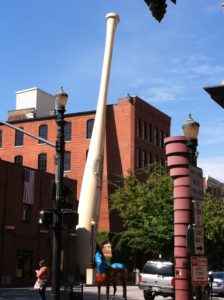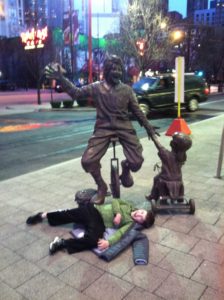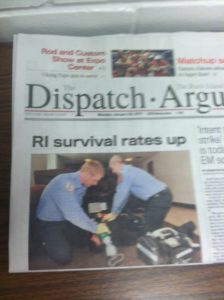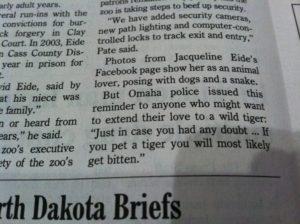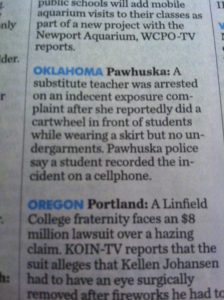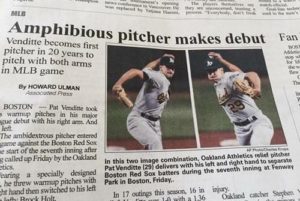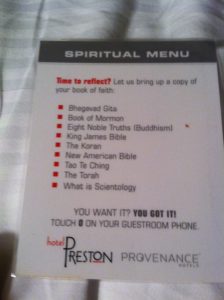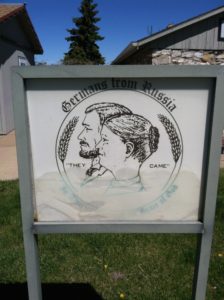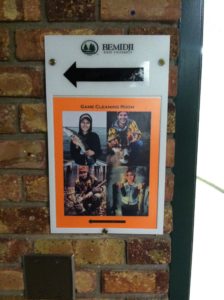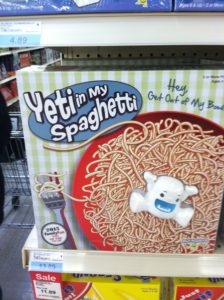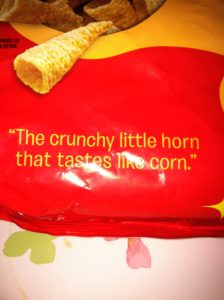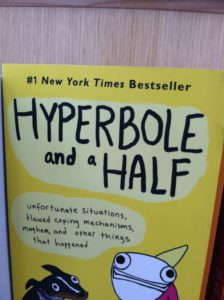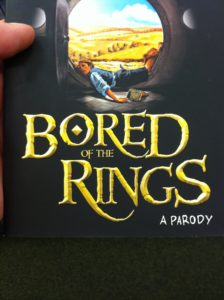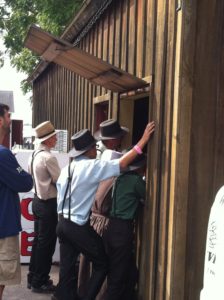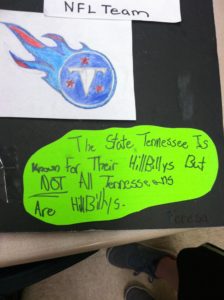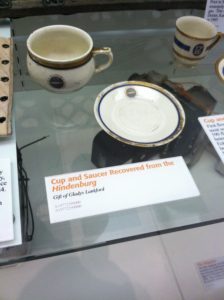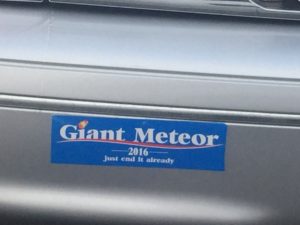For most of my adult life I have been a collector of literary esoterica. I love clever turns of phrase (intentional or not), strange juxtapositions of images and words, and brilliant quotes, both funny and serious. To satisfy my habit I seek out these gems in the places I have long found them. Local newspapers (particularly police blotters) are a treasure trove of entertaining tidbits. I also search the ubiquitous local guide books found in hotel lobbies. Not every town can be New York City, open 24/7 and overflowing with culture. When you are a little burg in the middle of nowhere you may have to get creative to bring in tourist dollars. Superlatives may be hard to come by. A recent “facts” segment in the Eastern Washington State tourism guide states:
The Palouse region grows 18% of the country’s lentils.
Yes, yes they do. You have to work with what you’ve got.
You might even have to add a few qualifiers to your local claim to fame:
COME AND SEE THE second LARGEST antique GUMBALL MACHINE IN southeastern McClean county MISSOURI!
I love these things, no matter how trumped up or qualified. I will happily drive 40 miles to see the largest ball of twine in Minnesota. I have. It is really big! – for Minnesota.
I plan to include more of my travel magazine finds in future posts as well as sundry items from small town newspapers. Here is a nice example from the Durango, CO Herald police blotter for Wednesday, August 22:
1:02 AM – Someone called to report that a man punched a car in the 900 block of Main Avenue.
1:26 PM – Someone’s tire was punctured in the 2700 block of Main Avenue. (This guy really has a problem with cars, I guess)
4:23 PM – Someone locked a bike to another person’s bike instead of the bike rack near Main Avenue and East Eight Street. (No crime too small)
10:54 pm – A man was in his underwear in the 500 block of Animas View Drive.
I think you see what I mean. This stuff is better than reality TV.
I have been reticent, lately, about posting to my blog. I have been working on some other writing projects and, I must admit, have been a bit lazy. I hereby pledge to post more regularly. That may include my own essays, short stories, and poetry. It may also include some of the “stuff” I encounter in my travels around the country. It’s stuffiminterestedin, after all.
__________________________________________
Today I want to feature the fruits of my other collecting hobby – Quotations. Everywhere I go and in everything I read I seek out really excellent quotes. I jot them down in my notebook and store them away for future inspiration. I look for profundity and humor. Great quotes are often the product of great minds, but not always. One of my favorite quotes of all time is a quick piece of bluster from the boxer Mike Tyson:
“Everybody has a plan, until they get punched in the mouth”
Quotes represent, to me, the perfect distillation of complex or confusing ideas into coherent, often beautiful, English. I love them and I collect them and I will share a bit of my collection with you. The quotes presented here will obviously reflect my own biases both politically and philosophically. Still, I am open to the well-crafted quote from people who represent other points of view and even some who I do not respect very much (Mr. Tyson, for example, or … Ronald Reagan).
I will start today with a couple of gentlemen who recently passed away and whose voices will be greatly missed. Both of these men were brilliant and intelligent and funny. Both had principles and were, in the truest sense of the word, humanists, which is the greatest compliment I can give a person.
_______________________________________________
Senator John McCain
The following quote was made by Senator McCain at a campaign rally on October 10, 2008 in response to one of his supporters who had called his opponent Barack Obama an “Arab” and said she was frightened of Obama being elected. This moment of political courage is unmatched in my lifetime. It shows definitively what a noble man John McCain was and why he will be missed so badly.
About Obama:
“No, M’aam, No M’aam, he’s a decent family man citizen that I just happen to have disagreements with on fundamental issues. He is a decent person and a person that you do not have to be scared of as President of the United States.”
More quotes by Senator McCain which reveal his humanity, brilliance, and logic:
“Our shared values define us more than our differences. And acknowledging those shared values can see us through our challenges today if we have the wisdom to trust in them.”
“Every day, people serve their neighbors and our nation in many different ways, from helping a child learn and easing the loneliness of those without a family to defending our freedom overseas. It is in this spirit of dedication to others and to our country that I believe service should be broadly and deeply encouraged.”
“The truth is sometimes a hard pill to swallow. It sometimes causes us difficulties at home and abroad. It is sometimes used by our enemies in attempts to hurt us. But the American people are entitled to it, nonetheless.”
“If you want to preserve democracy as we know it, you have to have a free and many times adversarial press. And without it, I am afraid that we would lose so much of our individual liberties over time. That’s how dictators get started.”
“War is wretched beyond description, and only a fool or a fraud could sentimentalize its cruel reality.”
“Our great power does not mean we can do whatever we want whenever we want, nor should we assume we have all the wisdom and knowledge necessary to succeed.”
________________________________________________
Anthony Bourdain
Anthony Bourdain was not a politician. He was a sometime drug addict and directionless youth who became the Executive Chef at a well-regarded New York restaurant. His 2000 book Kitchen Confidential became a surprise best-seller and catapulted Bourdain to fame and other media opportunities. Chief among these were No Reservations on the Travel Channel and CNN’s Anthony Bourdain: Parts Unknown. Both shows, focusing on food and travel, revealed Bourdain’s fundamental humanity, humility, decency, and integrity. He was intelligent, broad-minded, and generous.
“I should’ve died in my 20s. I became successful in my 40s. I became a dad in my 50s. I feel like I’ve stolen a car — a really nice car — and I keep looking in the rearview mirror for flashing lights. But there’s been nothing yet.”
“Life is complicated. It’s filled with nuance. It’s unsatisfying. … If I believe in anything, it is doubt. The root cause of all life’s problems is looking for a simple fucking answer.”
“Travel isn’t always pretty. It isn’t always comfortable. Sometimes it hurts, it even breaks your heart. But that’s okay. The journey changes you; it should change you. It leaves marks on your memory, on your consciousness, on your heart, and on your body. You take something with you. Hopefully, you leave something good behind.”
“Maybe that’s enlightenment enough: to know that there is no final resting place of the mind; no moment of smug clarity. Perhaps wisdom is realizing how small I am, and unwise, and how far I have yet to go.”
“Once you’ve been to Cambodia, you’ll never stop wanting to beat Henry Kissinger to death with your bare hands. You will never again be able to open a newspaper and read about that treacherous, prevaricating, murderous scumbag sitting down for a nice chat with Charlie Rose or attending some black-tie affair for a new glossy magazine without choking. Witness what Henry did in Cambodia — the fruits of his genius for statesmanship — and you will never understand why he’s not sitting in the dock at The Hague next to Milošević.”
“I love the sheer weirdness of the kitchen life: the dreamers, the crackpots, the refugees, and the sociopaths with whom I continue to work; the ever-present smells of roasting bones, searing fish, and simmering liquids; the noise and clatter, the hiss and spray, the flames, the smoke, and the steam. Admittedly, it’s a life that grinds you down. Most of us who live and operate in the culinary underworld are in some fundamental way dysfunctional. We’ve all chosen to turn our backs on the nine-to-five, on ever having a Friday or Saturday night off, on ever having a normal relationship with a non-cook.”
“Skills can be taught. Character you either have or you don’t have.”
_____________________________________________
Favorite Quotes from others
Kurt Vonnegut – American writer
“I am a humanist, which means, in part, that I have tried to behave decently without expectations of rewards or punishments after I am dead.”
“If what Jesus said was good, and so much of it was absolutely beautiful, what does it matter if he was God or not?”
“And I urge you to please notice when you are happy, and exclaim or murmur or think at some point, ‘If this isn’t nice, I don’t know what is.”
“If you want to really hurt your parents, and you don’t have the nerve to be a homosexual, the least you can do is go into the arts. Practicing an art, no matter how well or badly, is a way to make your soul grow.”
“Evolution can go to hell as far as I am concerned. What a mistake we are. We have mortally wounded this sweet life-supporting planet – the only one in the whole Milky Way – with a century of transportation whoopee.”
“Lot’s wife, of course, was told not to look back where all those people and their homes had been. But she did look back, and I love her for that, because it was so human.”
“We are what we pretend to be, so we must be careful what we pretend to be.”
“We are here to help each other get through this thing, whatever it is.” (Vonnegut credited this statement to his son, Mark)
________________________________________
Mark Twain – American writer
For those of you who think Mark Twain was some sort of comedian only, a humorist, try this on for size:
A God who could make good children as easily as bad, yet preferred to make bad ones; who could have made every one of them happy, yet never made a single happy one; who made them prize their bitter life, yet stingily cut it short; who gave his angels eternal happiness unearned, yet required his other children to earn it; who gave his angels painless lives, yet cursed his other children with biting miseries and maladies of mind and body; who mouths justice and invented hell, mouths mercy and invented hell, mouths golden rules, and forgiveness multiplied by seventy times seven, and invented hell; who mouths morals to other people and has none himself; who frowns upon crimes, yet commits them all; who created man without invitation, then tries to shuffle the responsibility for man’s acts upon man, instead of honorably placing it where it belongs, upon himself; and finally, with altogether divine obtuseness, invites this poor, abused slave to worship him! . . .
“What a helluva heaven it will be when they get all these hypocrites assembled there.”
“Man has been here 32,000 years. That it took a hundred million years to prepare the world for him is proof that that is what it was done for. I suppose it is. I dunno. If the Eiffel tower were now representing the world’s age, the skin of paint on the pinnacle-knob at its summit would represent man’s share of that age; & anybody would perceive that that skin was what the tower was built for. I reckon they would. I dunno.
“Good friends, good books, and a sleepy conscience: this is the ideal life.”
“Whenever you find yourself on the side of the majority, it is time to reform.”
“The man who does not read has no advantage over the man who cannot read.”
“A lie can travel half way around the world while the truth is putting on its shoes.”
“Never tell the truth to people who are not worthy of it.”
“Keep away from people who try to belittle your ambitions. Small people always do that, but the really great make you feel that you, too, can become great.”
“I did not attend his funeral, but I sent a nice letter saying I approved of it.”
“God created war so that Americans would learn geography.”
“Never allow someone to be your priority while allowing yourself to be their option.”
“Don’t part with your illusions. When they are gone you may still exist, but you have ceased to live.”
___________________________________
Elie Wiesel – Holocaust Survivor, Nobel Prize Winner, and author of Night
“The opposite of love is not hate, it’s indifference.”
“Because I remember, I despair. Because I remember, I have the duty to reject despair.”
“Once you bring life into the world, you must protect it. We must protect it by changing the world.”
“That I survived the Holocaust and went on to love beautiful girls, to talk, to write, to have toast and tea and live my life – that is what is abnormal.”
“Wherever men and women are persecuted because of their race, religion, or political views, that place must – at that moment – become the center of the universe.”
“Mankind must remember that peace is not God’s gift to his creatures; peace is our gift to each other.”
“When a person doesn’t have gratitude, something is missing in his or her humanity. A person can almost be defined by his or her attitude toward gratitude.”
____________________________________
Henry David Thoreau – American writer
“It is never too late to give up our prejudices.”
“If the machine of government is of such a nature that it requires you to be the agent of injustice to another, then, I say, break the law.”
“The youth gets together his materials to build a bridge to the moon, or, perchance, a palace or temple on the earth, and, at length, the middle-aged man concludes to build a woodshed with them.”
“My greatest skill has been to want but little.”
“If a man does not keep pace with his companions, perhaps it is because he hears a different drummer. Let him step to the music which he hears, however measured or far away.”
“The most I can do for my friend is simply be his friend.”
“The price of anything is the amount of life you exchange for it.”
When his aunt Louisa asked him in his last weeks if he had made his peace with God, Thoreau responded:
“I did not know we had ever quarreled.”
_______________________________________
Stephen Fry – Comedian, actor, intellectual, and atheist
To the question “What if you are wrong and find yourself standing before the Pearly Gates talking to God:
“I will basically say: Bone cancer in children? What’s that about? How dare you create a world in which there is such misery that is not our fault. It’s not right. It is utterly evil. Why should I respect a capricious, mean-minded, stupid god who created a world which is so full of injustice and pain. I wouldn’t want to get in [to heaven] on his terms. The god who created this universe, if it was created by a god, is quite clearly a maniac. Utter maniac. Totally selfish. We have to spend our life on our knees thanking him? What kind of god would do that? Yes, the world is very splendid, but it also has in it insects whose whole life cycle is to burrow into the eyes of children and make them blind. They eat outwards from the eyes. Why? Why did you do that to us? You could easily have made a creation in which that didn’t exist. It is simply not acceptable. So, atheism is not just about not believing theres a god. On the assumption that there is one what kind of god is he? It’s perfectly apparent he’s monstrous. Utterly, utterly monstrous and deserves no respect whatsoever. The moment you banish him your life becomes simpler, purer, cleaner, more worth living in my opinion.”
______________________________________________
OTHER FAVORITE QUOTES:
______________________________________________
Martin Amis – British novelist and essayist
“To say he is humorless I mean to deliberately impugn his seriousness.”
“If God existed, and if he cared for humankind, he would never have given us religion.”
_____________________________________________
Edith Sitwell – British poet and critic
“I am not eccentric. It’s just that I am more alive than most people. I am an unpopular electric eel set in a pond of catfish.”
“I am patient with stupidity, but not with those who are proud of it.”
_____________________________________________
Dorothy Parker – American poet, writer, and critic
“The first thing I do in the morning is brush my teeth and sharpen my tongue.”
“Razors pain you,
Rivers are damp,
Acids stain you,
And drugs cause cramp.
Guns aren’t lawful,
Nooses give,
Gas smells awful.
You might as well live.”
“Heterosexuality is not normal, it’s just common.”
“Don’t look at me in that tone of voice.”
“I don’t know much about being a millionaire, but I’ll bet I’d be darling at it.”
“Tell him I was too fucking busy– or vice versa.”
“By the time you swear you’re his,
Shivering and sighing.
And he vows his passion is,
Infinite, undying.
Lady make note of this —
One of you is lying.”
“That would be a good thing for them to cut on my tombstone: Wherever she went, including here, it was against her better judgment.”
“What fresh hell is this?”
“They sicken of the calm who know the storm.”
When asked by a friend to use the word horticulture in a senetence:
“You can lead a horticulture, but you can’t make her think.”
“Brevity is the soul of lingerie.”
But now I know the things I know
And do the things I do,
And if you do not like me so,
To hell, my love, with you.”
“This wasn’t just plain terrible, this was fancy terrible. This was terrible with raisins in it.”
“I require three things in a man: he must be handsome, ruthless, and stupid.”
“Take me or leave me; or, as is the usual order of things, both.”
“If you have any young friends who aspire to become writers, the second greatest favor you can do them is to present them with copies of The Elements of Style. The first greatest, of course, is to shoot them now, while they’re happy.”
______________________________________________
John Cage – American Composer
“I can’t understand why people are frightened of new ideas. I’m frightened of the old ones.”
_____________________________________________
Bill Nye (the Science Guy) – Television presenter and science communicator
“Everyone you will ever meet knows something you don’t.”
________________________________________________
Willa Cather – American writer
“There are only one or two human stories, and they go on repeating themselves as fiercely as if they had never happened.”
“I like trees because they seem more resigned to the way they have to live than other things do.”
________________________________________________
Christopher Hitchens – British/American journalist, writer, and prominent atheist
“Our problem is this; our prefrontal lobes are too small and our adrenaline glands are too big and our thumb finger opposition isn’t all it might be, and we’re afraid of the dark and we’re afraid to die and we believe in the truths of holy books that are so stupid and so fabricated that a child can, and all children do, as you can tell by their questions, actually see through them.”
____________________________________________
Robert M. Price – American theologian and writer
“I’m going to hell according to someone’s doctrine. (Islam, Christianity, etc). I may as well call them as I see them.”
______________________________________________
Pete Docter – Director of animated movies UP, Monsters Inc., and Inside Out
“Anyone out there who’s in junior high, high school, working it out, suffering, there are days you’re gonna feel sad, you’re gonna feel angry, you’re gonna be scared. That’s nothing you can choose, but you can make stuff. Make films. Draw. Write. It’ll make a world of difference.”
____________________________________________
H. L. Mencken – American journalist, essayist, and cultural critic
“A philosopher is a blind man in a dark room looking for a black cat that isn’t there. A theologian is the man who finds it.”
“On some great and glorious day the plain folks of the land will reach their heart’s desire at last, and the White House will be adorned by a downright moron.”
“Love is the delusion that one woman differs from another.”
“It was morality that burned the books of the ancient sages, and morality that halted the free inquiry of the Golden Age and substituted for it the credulous imbecility of the Age of Faith. It was a fixed moral code and a fixed theology which robbed the human race of a thousand years by wasting them upon alchemy, heretic-burning, witchcraft and sacerdotalism.”
“The final test of truth is ridicule. Not the laws of the United States but the mother-in-law joke brought the Mormons to surrender. Not the horror of it but the absurdity of it killed the doctrine of infant damnation. But the razor edge of ridicule is turned by the tough hide of truth.”
“We must respect the other fellow’s religion, but only in the sense and to the extent that we respect his theory that his wife is beautiful and his children smart.”
_____________________________________________
Garrison Keillor – American writer and radio host
“People with plenty of work to do are less enamored of self-destruction.”
“One reads books in order to gain the privilege of living more than one life. People who don’t read are trapped in a mine shaft, even if they think the sun is shining.”
“God writes a lot of comedy… the trouble is, he’s stuck with so many bad actors who don’t know how to play funny.”
“Some luck lies in not getting what you thought you wanted but getting what you have, which once you have it you may be smart enough to see is what you would have wanted had you known. ”
“Intelligence is like four-wheel drive. It only allows you to get stuck in more remote places.”
“Sex is good, but not as good as fresh sweet corn.” (I’m not too sure about that one)
“The most un-American thing you can say is, ‘You can’t say that.”
“They say such nice things about people at their funerals that it makes me sad to realize that I’m going to miss mine by just a few days.”
_______________________________________________
Anonymous
“Saying Lincoln was a Republican is like saying Nicholas Cage won an Oscar. Technically it’s true, but a lot of shit has happened since then.”
_______________________________________________
Malcolm Gladwell – Canadian journalist and author
“You don’t want bureaucracies run by Marine Corps guys. The worst thing that can happen if you’re in a bureaucracy is if the bureaucracy gets really, really good. Our liberties are imperiled overly competent bureaucrats.”
“We have, as human beings, a storytelling problem. We’re a bit too quick to come up with explanations for things we really don’t have an explanation for.”
“Insight is not a lightbulb that goes off inside our heads. It is a flickering candle that can easily be snuffed out.”
__________________________________________________
Groucho Marx – American comedian, writer, and actor
“There is one way to find out if a man is honest: ask him; if he says yes, you know he’s crooked.”
“I dont want to belong to any club that will accept me as a member.”
“A black cat crossing your path signifies…that the animal is going somewhere.”
“Quote me as saying I was mis-quoted.”
________________________________________________
Ernest Hemingway – Nobel prize-winning writer
“Happiness in intelligent people is the rarest thing I know.”
“The best way to find out if you can trust somebody is to trust them.”
“There is nothing noble in being superior to your fellow man; true nobility is being superior to your former self.”
“The first draft of anything is shit.”
“I drink to make other people more interesting.”
“It is better to be lucky. But I would rather be exact. Then when luck comes you are ready.”
“All thinking men are atheists.”
“If people bring so much courage to this world the world has to kill them to break them, so of course it kills them. The world breaks every one and afterward many are strong at the broken places. But those that will not break it kills. It kills the very good and the very gentle and the very brave impartially. If you are none of these you can be sure it will kill you too but there will be no special hurry.”
“But man is not made for defeat. A man can be destroyed but not defeated.”
“Every man’s life ends the same way. It is only the details of how he lived and how he died that distinguish one man from another.”
“If two people love each other there can be no happy end to it.”
“All stories, if continued far enough, end in death, and he is no true-story teller who would keep that from you.”
____________________________________________
Joan Didion – American journalist and writer
“we tell ourselves stories in order to live.”
“I did not always think he was right nor did he always think I was right, but we were each the person the other trusted.”
“Innocence ends when one is stripped of the delusion that one likes oneself.”
______________________________________________
Elif Shafak – Turkish novelist and essayist
“If we learn anything, we learn it from people who are different from us.”
“For extremism to work they need to dehumanize ‘the other.’ Fiction rehumanizes. Fiction tells us that the person you saw as ‘the other’ has a story. If you know that person’s story, you can connect with that person’s sorrow or hopes. In a world of so much conflict, we need the art of story-telling like never before.”
_________________________________________
Iris Murdoch – British novelist
“People from a planet without flowers would think we must be mad with joy the whole time to have such things about us.”
“I daresay anything can be made holy by being sincerely worshipped.”
“At crucial moments of choice most of the business of choosing is already over.”
_____________________________________________
Neil Pasricha – Canadian author, blogger, and podcaster
“None of your ancestors was a virgin”
____________________________________________
Ronald Reagan – (Written by Reagan’s chief speech writer Ken Khachigian)
“How can we love our country and not love our countrymen, and loving them, reach out a hand when they fall, heal them when they are sick, and provide opportunities to make them self-sufficient so they will be equal in fact and not just in theory?”
__________________________________________
Charles Dickens – English writer
“Spring is the time of year when it is summer in the sun and winter in the shade.”
________________________________________
Eleanor Roosevelt – First lady of the United States and diplomat
“Great minds discuss ideas; average minds discuss events; small minds discuss people.”
“No one can make you feel inferior without your consent.”
________________________________________
Samuel Johnson – English writer and lexicographer
“Patriotism is the last refuge of the scoundrel.”
“The true measure of a man is how he treats someone who can do him absolutely no good.”
“Nothing will ever be attempted if all possible objections must first be overcome.”
“Great works are performed not by strength but by perseverance.”
_________________________________________
Adam Smith – Scottish Economist
“Science is the great antidote to the poison of enthusiasm and superstition.”
__________________________________________
Richard Feynman – American Physicist
“Physics is like sex: sure, it may give some practical results, but that’s not why we do it.”
“You have no responsibility to live up to what other people think you ought to accomplish. I have no responsibility to be like they expect me to be. It’s their mistake, not my failing.”
“Fall in love with some activity, and do it! Nobody ever figures out what life is all about, and it doesn’t matter. Explore the world. Nearly everything is really interesting if you go into it deeply enough. Work as hard and as much as you want to on the things you like to do the best. Don’t think about what you want to be, but what you want to do. Keep up some kind of a minimum with other things so that society doesn’t stop you from doing anything at all.”
“The first principle is that you must not fool yourself and you are the easiest person to fool.”
“If you thought that science was certain – well, that is just an error on your part.”
“I’m smart enough to know that I’m dumb.”
“I would rather have questions that can’t be answered than answers that can’t be questioned.”
“All the time you’re saying to yourself, ‘I could do that, but I won’t,’ — which is just another way of saying that you can’t.”
“Physics is to math what sex is to masturbation.”
“It doesn’t seem to me that this fantastically marvelous universe, this tremendous range of time and space and different kinds of animals, and all the different planets, and all these atoms with all their motions, and so on, all this complicated thing can merely be a stage so that God can watch human beings struggle for good and evil – which is the view that religion has. The stage is too big for the drama.”
_____________________________________________
And, finally, some immortal wisdom from The Princess Bride
“A few more steps and we’ll be safe in the fire swamp.”
“We’ll never survive.”
“Nonsense, you’re only saying that because no one ever has.”
________________________________________________
by: Dustin Joy


























